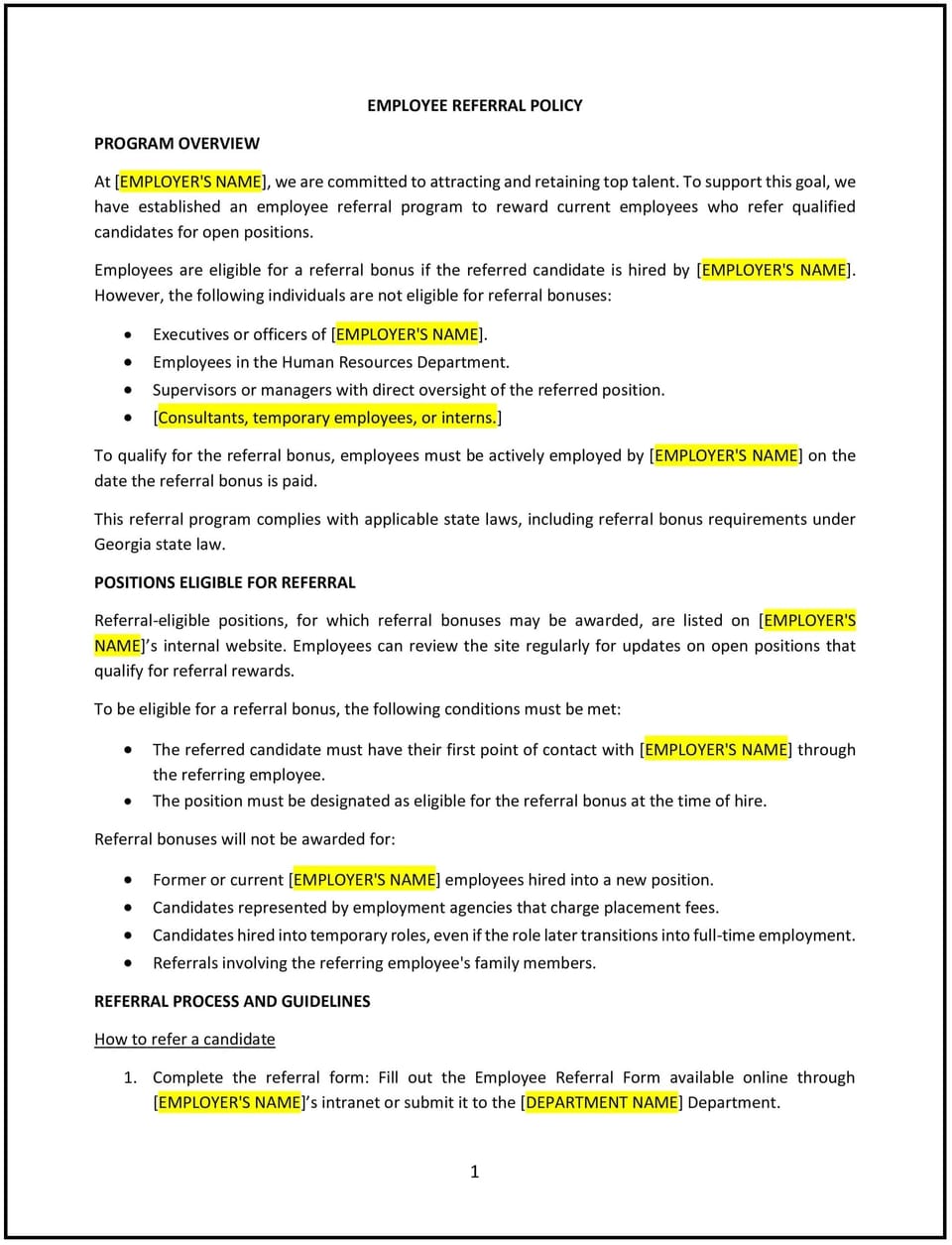Employee referral policy (Georgia): Free template

Employee referral policy (Georgia)
This employee referral policy is designed to help Georgia businesses encourage their employees to recommend qualified candidates for open positions. The policy outlines eligibility criteria, referral procedures, and potential rewards to foster employee engagement and enhance the hiring process.
By implementing this policy, businesses can attract top talent, strengthen workplace culture, and reward employees for their contributions to recruitment efforts.
How to use this employee referral policy (Georgia)
- Define referral eligibility: Clearly state which employees are eligible to participate in the referral program and any exceptions (e.g., managers hiring for their own teams).
- Outline the referral process: Provide step-by-step instructions for submitting referrals, such as using a referral form, email, or online system.
- Set reward criteria: Specify the rewards employees may receive for successful referrals, such as bonuses, gift cards, or additional time off, and any conditions for receiving them.
- Include eligibility of referred candidates: Define what qualifies a candidate as eligible, such as meeting job requirements and being a new applicant to the company.
- Communicate evaluation timelines: Inform employees about how long it will take to evaluate referred candidates and determine their eligibility for rewards.
- Address reward timing: Specify when rewards will be distributed, such as after the new hire completes a probationary period or a specific duration of employment.
- Promote the program: Regularly remind employees about the referral policy through internal communications, such as emails, newsletters, or team meetings.
- Review and update regularly: Periodically assess the policy’s effectiveness and update it based on employee feedback or changes in Georgia-specific hiring practices.
Benefits of using this employee referral policy (Georgia)
Implementing this policy provides several advantages for Georgia businesses:
- Attracts top talent: Leveraging employees’ networks brings in candidates who are more likely to align with company values and culture.
- Reduces recruitment costs: Employee referrals often lower expenses compared to external recruiting methods.
- Boosts engagement: Employees feel valued and involved in shaping the team when they can recommend candidates.
- Improves retention: Referred hires typically have higher retention rates, benefiting long-term workforce stability.
- Reflects Georgia-specific needs: Tailoring the policy to local workforce dynamics ensures it resonates with employees and aligns with hiring trends.
Tips for using this employee referral policy (Georgia)
- Encourage participation: Regularly highlight the benefits of the referral program to motivate employees to participate.
- Provide clear guidelines: Ensure employees understand how the referral process works, including eligibility criteria and reward conditions.
- Recognize contributions: Publicly acknowledge employees who successfully refer candidates to reinforce positive behavior.
- Track program success: Monitor the number and quality of hires from referrals to evaluate the program’s effectiveness.
- Adjust rewards as needed: Update incentives based on employee feedback to maintain interest in the program.
Q: Who is eligible to participate in the referral program?
A: All employees, except for those directly involved in the hiring decision for a referred candidate, are typically eligible to participate.
Q: What types of rewards are offered for successful referrals?
A: Rewards may include monetary bonuses, gift cards, or additional paid time off, depending on the business’s specific program guidelines.
Q: How should employees submit referrals?
A: Employees should submit referrals using the designated process, such as completing a referral form or emailing HR with the candidate’s details.
Q: When will rewards be distributed?
A: Rewards are typically given after the referred candidate has been hired and completed a probationary period or a set duration of employment.
Q: Are there restrictions on who can be referred?
A: Referred candidates must meet the job qualifications and should not be current applicants or previous employees.
Q: How can businesses promote the referral program?
A: Businesses should use internal communication channels, such as emails, newsletters, or meetings, to remind employees of the program and its benefits.
Q: How often should this policy be reviewed?
A: The policy should be reviewed annually or as needed to align with changes in Georgia’s workforce dynamics or business objectives.
This article contains general legal information and does not contain legal advice. Cobrief is not a law firm or a substitute for an attorney or law firm. The law is complex and changes often. For legal advice, please ask a lawyer.


